#raised protestant
Text
Maybe the problem with Christian fiction is that it's non-denominational. People are just "Christian", with no effort put into showing what practicing that religion looks like for them specifically. No indication that there are other Christians who could have different beliefs. No wrestling with differing ideas and the struggle of how one should live out their Christian faith. And that makes it unrealistic and unrelatable.
#me reading any christian historical fiction set in england: why are none of these gentry anglican??#they ARE all anglican and if they are not it is extremely plot and character relevant you can't just have them using evangelical buzzwords#but i'm also thinking of this because i started another charlotte yonge book#that is by far my favorite of the things of hers that i've read#because it has characters who have different upbringings and religious opinions#instead of just 'here's a bunch of high church anglicans judging people who don't live up to their victorian standard'#you have the very high church anglican rector whose wife is worldly but still a very good person#the girl raised in a very strict protestant family who is more scrupulous than the anglicans but is still recognized as a good person#you have people who are trying to work out the nuances of different issues#and that makes it so much more realistic and so much easier to integrate into the story#(the politics though are hilarious)#(most of the classics that survive are the ones that were 'ahead of their time' in politics)#(so it's equally fascinating and refreshing and a bit infuriating to see one that is very very of its time with regards to women's rights)#('why did this woman get up at the meeting and explain her very good ideas for rebuilding after the fire? she should have had a man do it')#(meanwhile i'm just screaming 'why on earth SHOULDN'T she???')#(it's almost enough to make a feminist of me)
372 notes
·
View notes
Text
Lloyd’s the kind of person to be completely silent while everyone is horribly singing Bohemian Rhapsody only to belt out the line “I sometimes wish I’d never been born at all” in perfect pitch and then fall dead silent again as he went back to like, reading a book or something. send post
#ninjago#lego ninjago#lloyd garmadon#bohemian rhapsody#i sometimes wish id never been born at all#headcanons#ideas#jokes#text post#speaking#for the record lloyd the kinda person to be silent as in he protests to everyone he cant sing#or he just doesnt wanna sing so hes just fending them off as they sing#then the line comes and hes like a sleeper agent and sings the line like hes done so a hundred other times#then laugh and brush it off and go back to not singing again#and for the OTHER record#the other ninja are not exempt from this. all of them sing that line like their lives depend on it#except for zane because my boy does not sing unless he has downloaded content <3 hes the one playing the music but he vibes w it#lloyds just the one who has it down like an ART#lloyd also sings 'you shouldve raised a baby girl i shouldve been a better son' from mcr#because he is trans. 2 me. kai also sings out that part with just as much passion. they are shaking hands#and also lloyd was just an mcr kid change my mind
308 notes
·
View notes
Text
me: idk being raised protestant didn't really impact me in any way I think? Like... that was just a moment in my life
also me: *writes the following bit*

#codywan#commander cody#obi wan kenobi#star wars#like u sure about that Sol?#You sure being raised Protestant didnt impact u in any way?#u wanna talk about it?
93 notes
·
View notes
Text






#free palestine#free gaza#gaza#palestine#from the river to the sea palestine will be free#pray for palestine#plestia alaqad#byplestia#genocide#ethnic cleansing#current events#protest#boycott#raise awareness#journalism#ceasefire#permanent ceasefire#america#usa#israel#israel occupation
50 notes
·
View notes
Note
What was garak like as castellan? (ps your art is 💞💕❤️❤️💕💞💕❤️💕💞💕)
OOHOHO GARAK AS CASTELLAN....
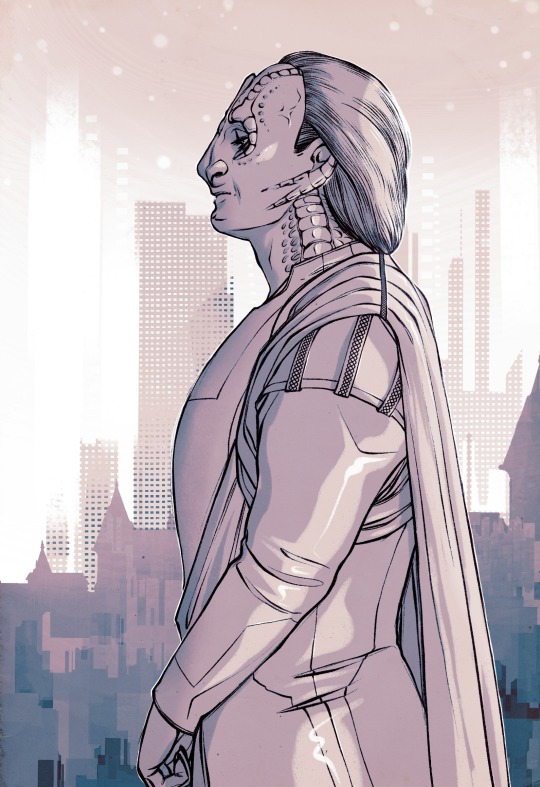
I think his time in the Federation has, despite his best efforts, affected his outlook on politics. He's a wary centrist now, as if Cardassia has the luxury of political discourse not related to basic sustenance.... trying to delicately excise the most distasteful parts of the prior totalitarian regime while still supporting the structures that keep people alive.
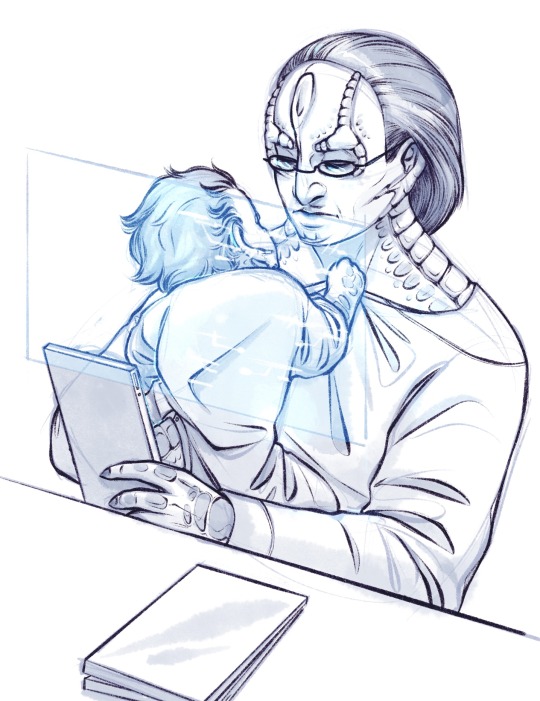
I don't think there's a way to be a well-liked leader after an annihilative disaster, honestly. Garak's not an exception. He's NOT a popular Castellan, but he WAS the least bad choice immediately on hand, and he's adept at securing badly needed aid from Federated interests. He can be very persuasive and diplomatic, and he circumvents or cuts through the bureaucratic and political obstacles that would've trapped less canny men. He's in power during the setting of the foundation of the Cardassian economic miracle and he stalwartly weathers years of vicious criticism and assassination attempts (that he easily evades). As soon as he retires his approval rating goes from like 15% to 80%. He's the Grandfather of Cardassia, their mercurial constant, their deviously bitchy figurehead who can hold his own against any rival leader. The wily old regnar who raised a generation of hungry utopian statesmen. A Castellan to be privately eviscerated and publicly saluted.
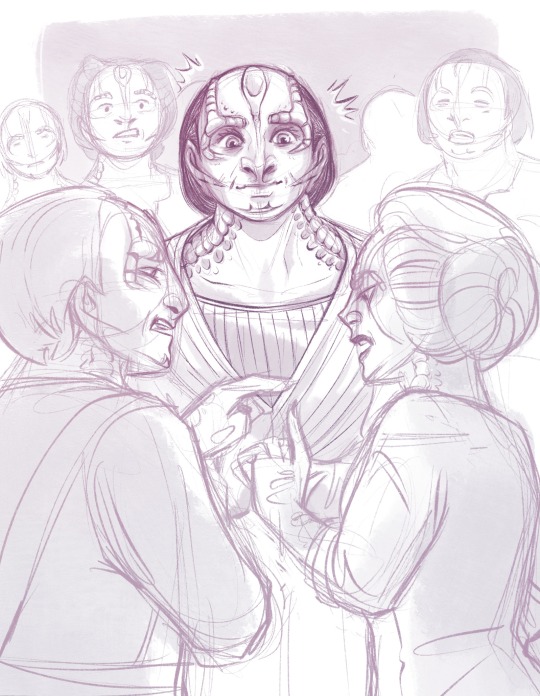
Mostly he's just trying to go home at some point during the night to quietly whisper 'good-night' to his kids and husband, though
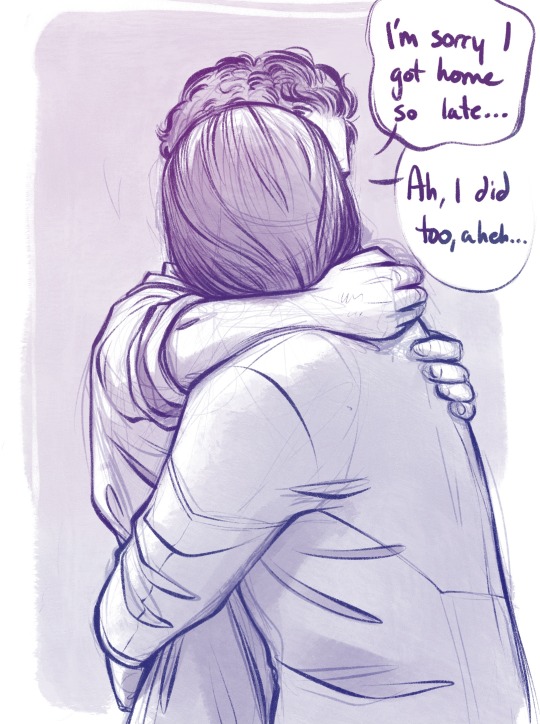
#dee s 9#garashir adoption au#HEHEHE THANK YOU OUUUUGHHHHHHHHHH#i always thought. bully for abraham lincoln getting offed RIGHT as the war was coming to a close#you KNOW that he would not enjoy his current reputation if he'd had to preside over reconstruction. he'd be andrew johnsoned.#I do not think Garak would like being Castellan at all. I think he would be adequately good at it.#he needs kira and natima lang to occasionally waterspritz him when he thinks about instituting a secret police or cracking down on protests#lol between him and julian working full time and a half at the hospital lim and iskra are like raising themselves lol#no jk jk they figure out a good work life balance at some point...#hwaugh i want to draw so much more but my MOMMY is coming to visit. ill do more later and rebagel it.#rekelen and hogue... castellan lang (my FAVORITTTEEE trope) and her attache iskra...#castellan garak meeting a federation diplomatic delegation...
106 notes
·
View notes
Text
Hey I don't want to make a big deal out of this because it is decidedly not the principle problem right now but I would be extremely wary of posts that sound the alarms over specifically Ashkenazi Jews. Please think it over: how does pinning the blame for an atrocity on a specific minority group help the Palestinian cause in any way? It doesn't. Not only is it reductive but there are millions of Ashkenazis many other countries, yours and mine, who overwhelmingly have no ties to Israel, no family there, no history there, who rightfully despise it and all it stands for, and who are regularly harassed and attacked for being Jewish BY WHITE SUPREMACISTS....I would suggest reblogging literally any other post about Palestinian causes, aid, protests, culture, updates etc. They are suffering beyond IMAGINATION and we're not going to use their pain to legitimize bog standard easily identifiable antisemitic canards. Zionists crying antisemitism over condemnation of Israel are full of shit. But this IS crystal clear antisemitism. Please be wary of that and focus on Palestinian aid.
#I'm not going to get into conditional whiteness right now because it's not worth it#just please think about what a post line that is trying to achieve#im surprised that a post attempting to lend credence 2 the idea that Ashkenazis are too powerful and bloodthirsty isnt raising any eyebrows#isreal is bloodthirsty and bankrolled by the must powerful nations#why the fuck are we talking about a huge ethnoreligious group with a long history of persecution with tons of diaspora#globally the vast majority of us have very little and have absolutely nothing to do with the state isreal wants to establish#globally so so many of us are PROTESTING this genocide#come on man.
42 notes
·
View notes
Text
listen. I don't just love father brown because I first saw it while ill with the flu or because it's consistently kind to the outcast in a way that has reviewers calling it Too Woke, obviously a vote in its favour. or because the recurring thief character is very pretty to watch. though those are significant parts of it.
I love it because after eight seasons father brown sits down with the village drunk (a munitions expert in the war, has a soft spot for the parish secretary, name of harold or blind harry) to find out why he gave a murder suspect a false alibi and harry explains to him, calm as you like, that seeing the life leave someone's eyes changes a person, that it's what he reckons brought father brown to his faith, that it's what drove him to drink, and he didn't see that shadow in the guy the police are chasing this time. and father brown, rather than justifying or correcting or dodging or doubting him, says he knows how unjust the situation is. that he got something good out of the horrors of the war. that harry really didn't.
it is not a perfect show and yes I have problems with it but gosh, this is a character who's largely used for comedic beats, albeit kindly, and a scene like this isn't out of place at all but it still takes my breath away. we could've been left with this as subtext, y'know? I hadn't even put together that his alcoholism must have been trauma. but instead harry tells us this directly, tells us it's about guilt, that that's something he shares with father brown, who is competent and so often cheerful and I can't even imagine when he was younger, and it's a moment of such unexpected humanity and respect. and it's such a strange thing to see these characters side by side like that.
the scene ends with father brown calling harry a good man, and harry denying it ("they was only young lads" "so were we, harold. so were we.") and the two them sharing a drink as father brown gets a bit watery-eyed and I'm crying too over my nice cosy 'this is a concerning number of murders for a sleepy english village' show and just. hi. what. ow.
I also haven't recovered from the episode that turned into a heist halfway through but frankly I'm only mentioning that because I don't know how to wrap up a post like this. (it was good though. there were two separate honeypots, three if you count the impromptu replacement, one character terrible at grifting and one unexpectedly great at it, and, somehow, a con within a con. it was really very fun. get a show that can do both, I guess?)
#back on my bullshit (unrepentant)#I was raised so protestant I retain a deep suspicion of priests so this remains very startling to me#something something father brown handshake emoji iroh#love where they are now no clue how they got there but it's always kind of a shock to be reminded there was blood along the way#also like. the kindness. the tea. the fondness for life's small pleasures.#pretending to be harmless and friendly and also BEING harmless and friendly to the core.#this is an association I had not made before so if you'll excuse me I'm gonna go hide my face in a pillow about it#father brown#falderal speaks#love a show that waits until you're comfy and then smacks you with a very human reminder of the horrors of war#love a character with. moral injury. listen shush I'm very predictable I just hadn't put together that it was father frikking brown too#silly little (not little) guy who elbows his way into situations by smiling pleasantly at people and who likes cake and jazz music#it's not like I forget he has depth I just. forget that the story GOES there#and so respectfully. harold who is usually slightly comic relief getting a serious moment that explains a lot and doesn't even feel jarring#I'm stopping here but like. good show‚ show. I did in fact have unexpected emotions about it.
57 notes
·
View notes
Text
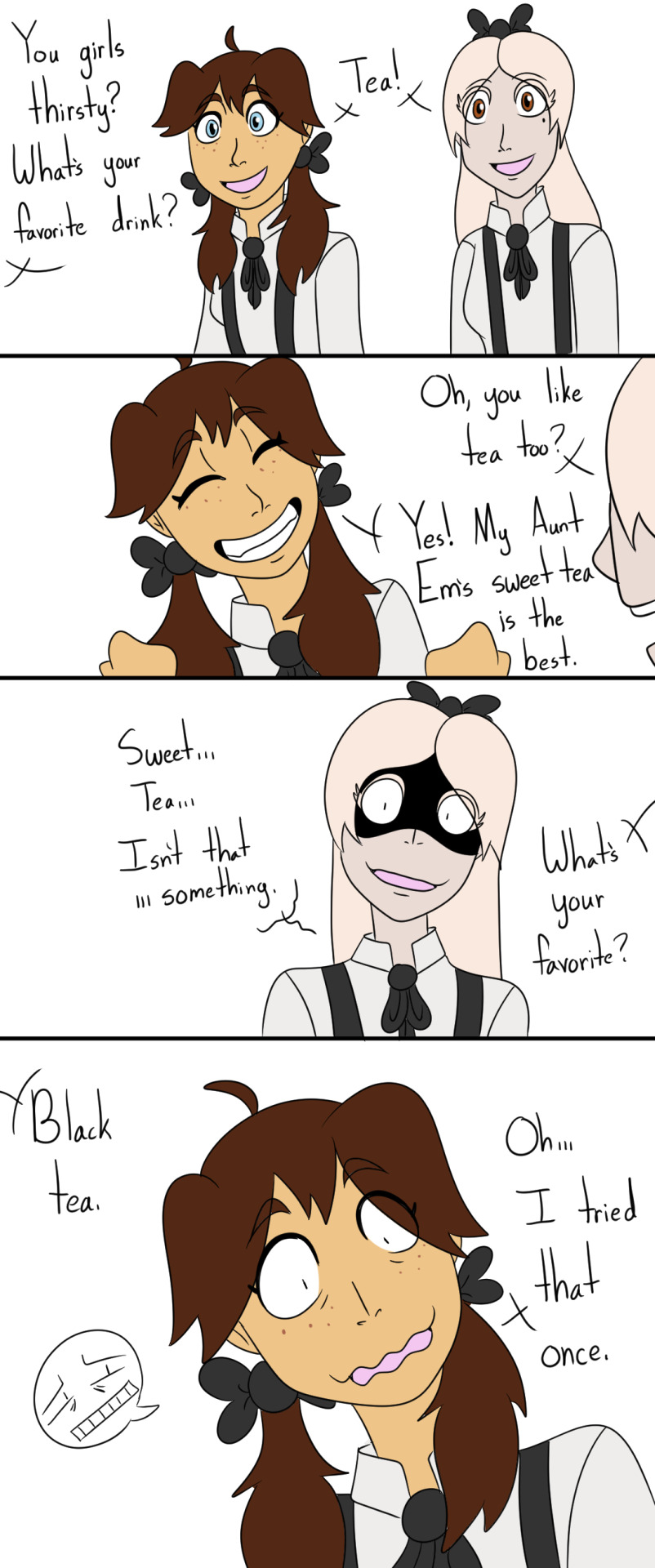
I just realized last night they'd have vastly different tastes in food and drink
#this is almost bad as when alice found out dorothy was raised protestant and not catholic lol#wonderland of oz#dorothy gale#alice liddell
37 notes
·
View notes
Text
it is 12:43 on a saturday im sorting beads on my floor and coming to the realization that i think i was raised fundamentalist???
#text#ive just been saying like evangelical vaguely fundie vaguely protestant#bc no one would tell me what denomination we were it was ljust Oh we dont have one we just follow the bible 🙂#but im watching a video from an ex fundie rn and a lot of the stuff shes saying shes disclaiing with Ik this sounds crazy if u werent#raised this way and its still somethint i see as somehwst normal ???#like not having secular friends til ur in public school Like that was just normal for me.is that not normal
45 notes
·
View notes
Text
I'm no fan of the Catholic Church but sometimes I see posts on here that make me wonder if some of you have ever actually interacted with a Catholic. Especially Americans blaming things on Catholics that are far more attributable to Evangelical Protestants.
Or saying things about Catholics that basically just sound like protestant anti-Catholic rhetoric repackaged in a "progressive" sounding way. In the US, the Catholic Church is not the dominant religious influence and it doesn't seem super productive to ignore the sources of the actual dominant Christian rhetoric and culture.
#i know it's a bit difference because protestants don't have a centralised institution like the RCC#but given the history of Christianity in the US#I'm a little suspicious of Americans who were raised protestant or in protestant-dominated areas taking shots at Catholics#probably going to be arrested for the capital Tumblr crime of Acknowledging Nuance
15 notes
·
View notes
Text
Alright uninformed rant time. It kind of bugs me that, when studying the Middle Ages, specifically in western Europe, it doesn’t seem to be a pre-requisite that you have to take some kind of “Basics of Mediaeval Catholic Doctrine in Everyday Practise” class.
Obviously you can’t cover everything- we don’t necessarily need to understand the ins and outs of obscure theological arguments (just as your average mediaeval churchgoer probably didn’t need to), or the inner workings of the Great Schism(s), nor how apparently simple theological disputes could be influenced by political and social factors, and of course the Official Line From The Vatican has changed over the centuries (which is why I’ve seen even modern Catholics getting mixed up about something that happened eight centuries ago). And naturally there are going to be misconceptions no matter how much you try to clarify things for people, and regional/class/temporal variations on how people’s actual everyday beliefs were influenced by the church’s rules.
But it would help if historians studying the Middle Ages, especially western Christendom, were all given a broadly similar training in a) what the official doctrine was at various points on certain important issues and b) how this might translate to what the average layman believed. Because it feels like you’re supposed to pick that up as you go along and even where there are books on the subject they’re not always entirely reliable either (for example, people citing books about how things worked specifically in England to apply to the whole of Europe) and you can’t ask a book a question if you’re confused about any particular point.
I mean I don’t expect to be spoonfed but somehow I don’t think that I’m supposed to accumulate a half-assed religious education from, say, a 15th century nobleman who was probably more interested in translating chivalric romances and rebelling against the Crown than religion; an angry 16th century Protestant; a 12th century nun from some forgotten valley in the Alps; some footnotes spread out over half a dozen modern political histories of Scotland; and an episode of ‘In Our Time’ from 2009.
But equally if you’re not a specialist in church history or theology, I’m not sure that it’s necessary to probe the murky depths of every minor theological point ever, and once you’ve started where does it end?
Anyway this entirely uninformed rant brought to you by my encounter with a sixteenth century bishop who was supposedly writing a completely orthodox book to re-evangelise his flock and tempt them away from Protestantism, but who described the baptismal rite in a way that sounds decidedly sketchy, if not heretical. And rather than being able to engage with the text properly and get what I needed from it, I was instead left sitting there like:
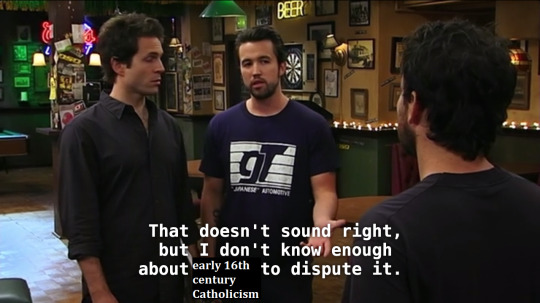
And frankly I didn’t have the time to go down the rabbit hole that would inevitably open up if I tried to find out
#This is a problem which is magnified in Britain I think as we also have to deal with the Hangover from Protestantism#As seen even in some folk who were raised Catholic but still imbibed certain ideas about the Middle Ages from culturally Protestant schools#And it isn't helped when we're hit with all these popular history tv documentaries#If I have to see one more person whose speciality is writing sensational paperbacks about Henry VIII's court#Being asked to explain for the British public What The Pope Thought I shall scream#Which is not even getting into some of England's super special common law get out clauses#Though having recently listened to some stuff in French I'm beginning to think misconceptions are not limited to Great Britain#Anyway I did take some realy interesting classes at uni on things like marriage and religious orders and so on#But it was definitely patchy and I definitely do not have a good handle on how it all basically hung together#As evidenced by the fact that I've probably made a tonne of mistakes in this post#Books aren't entirely helpful though because you can't ask them questions and sometimes the author is just plain wrong#I mean I will take book recommendations but they are not entirely helpful; and we also haven't all read the same stuff#So one person's idea of what the basics of being baptised involved are going to radically differ from another's based on what they read#Which if you are primarily a political historian interested in the Hundred Years' War doesn't seem important eonugh to quibble over#But it would help if everyone was given some kind of similar introductory training and then they could probe further if needed/wanted#So that one historian's elementary mistake about baptism doesn't affect generations of specialists in the Hundred Years' War#Because they have enough basic knowledge to know that they can just discount that tiny irrelevant bit#This is why seminars are important folks you get to ASK QUESTIONS AND FIGURE OUT BITS YOU DON'T UNDERSTAND#And as I say there is a bit of a habit in this country of producing books about say religion in mediaeval England#And then you're expected to work out for yourself which bits you can extrapolate and assume were true outwith England#Or France or Scotland or wherever it may be though the English and the French are particularly bad for assuming#that whatever was true for them was obviously true for everyone else so why should they specify that they're only talking about France#Alright rant over#Beginning to come to the conclusion that nobody knows how Christianity works but would like certain historians to stop pretending they do#Edit: I sort of made up the examples of the historical people who gave me my religious education above#But I'm now enamoured with the idea of who actually did give me my weird ideas about mediaeval Catholicism#Who were my historical godparents so to speak#Do I have an idea of mediaeval religion that was jointly shaped by some professor from the 1970s and a 6th century saint?#Does Cardinal Campeggio know he's responsible for some much later human being's catechism?#Fake examples again but I'm going to be thinking about that today
128 notes
·
View notes
Text
Learning how to be comfortable with being uncomfortable is important. I'm genuinely not okay when I hear, see, and research more about the genocide happening in Gaza, the history of Israel's founding, and its terroristic actions. It is important for me to know.
Taking short breaks (usually a couple of hours or so) does help when things get too much. Then, I return and continue engaging with reblogs on Palestine.
I really don't know what else to say, but this genocide must end. All genocides must end and must never happen again. Keep talking about Palestine, Armenia, Congo, and Sudan! Keep protesting! Keep fighting!
What is important now is to be as loud as you can be! Raise ruckus! Make your voice unavoidable! Be as annoying as possible! Do not let your representatives ignore this!
#// vent#// vent in tags#also eat butt biden you piece of shit I hope you don't get elected#no possibility of a ceasefire my ass WHAT THE HELL IS FUCKING STOPPING YOU FROM CALLING A CEASEFIRE#HOSPITALS SCHOOLS AND PLACES OF WORSHIP WERE BOMBED#YOU HAVE THOUSANDS OF PEOPLE PROTESTING AROUND THE WORLD AND FROM THIS COUNTRY DO YOU NOT FUCKING HEAR THEM#Jewish protesters were arrested too; how does their protesting against Israel warrant arrest??#Some of them were also doxxed and harassed but they protesting is bad somehow okay I have serious questions about this#they do not want this at all; why are we arresting them??#what are we fucking doing? Denying someone's right to freedom of protest. Freedom of speech. For saying stop killing people.#god forbid the marginalized rise up and raise our voices once we understand what happened to us and what will happen to others#we all stand together we will see a better world; a world we finally be free#but that means the US needs to really take a bit of time to really realize it's own history and learn from it for once#how the hell I got here? What happened to my people? I read the stories of slaves who barely survived the boats on the way here#....annnd I remember that some history books in the South omit that part. What's up with that?#And the Native Genocide here too? The broken promises the US made to steal more land and kill more people#Why this keeps repeating???#palestine#tw colonialism#genocide
19 notes
·
View notes
Text
← the world's first protestant to experience debilitating catholic guilt
#i'm. not currently protestant. but considered i was raised by evangelicals i don't fully understand why my *** has such a distinctly Catholi#*Catholic flavor.
18 notes
·
View notes
Text
I don’t not like it when people make the parish very Formal And Ritualized And Weird in fanworks but part of what feels so real about it to me in canon is the mundanity of it all. Guidance isn’t dressed like a nun, she just looks like a mom. The parish doesn’t have to be visually weird to be a cult.
#like the ritual stuff is sexy and neat but I do think it misses something about how canon does it#very rare to see a fictional cult that’s not like. long spooky robes and stuff.#and a lot of it is meant to be kinda catholic which I guess makes sense but the parish feels far more Protestant to me#i think Justin ? made a joke about how clear it is they were raised southern baptist from how griffin describes it#and like. yeah. in a very positive way.#idk if I’m making sense#icarus is talking#taz#taz Ethersea
18 notes
·
View notes
Text
taylor said the lord's prayer to try to get the angel to not attack him and said it wrong so I was expecting the angel to attack him bc he said it wrong LOL
#dndads spoilers#<- not really but like . its from the new episode so#unfortunately being raised protestant with a pastor for a mom will have you remembering the lords prayer for the rest of ur life
11 notes
·
View notes
Text
what was bucky calling himself in romania? did he use the romanian variant of James (Iakob) when he talked to people and had to give them a name? how did he even learn romanian? does he have romanian heritage? did he learn it during the war? how did he pay rent? was he working in construction or as a line cook or something? did he have a little old lady as a neighbour who thought he was too skinny and lonely and forced him to eat with her at least once a week? did she make him help with cooking so he could make the food himself? did he go to the orthodox church with her? did the local kids like him? did he cut his hair himself or did he brave going to a barbers to keep it at a length he liked? did he like talking to market sellers about fruit because it was an easy conversation and a way for him to get used to socialising?
i have SO many questions about bucky in romania
#like i know it was just a nod to sebstan being romanian which is very cute imo#but also the logistics of this#is bucky romanian? is his mother romanian and changed her last name when she married his dad?#did he grow up orthodox or protestant?#why romania?#its a smart move going to a capital city and hiding in plain sight especially considering how much he physically changed over those two yea#homeboy was eating snacks all the time and absolutely thriving#except the whole 'sleeping bag on the mattress' situation but you know what i mean#sometimes i think about sebstan in interviews talking about being romanian and the cultural effects of that#his mother reading coffee dregs (like reading tea leaves) and being raised orthodox christian#i wonder how much of that bleeds into bucky#because bucky choosing romania of all places kind of implies some kind of connection#beyond the connection with the soviet arm of hydra#bucky barnes#bucky meta#bucky barnes meta#mcu meta#cacw meta#civil war meta#marvel#mcu
260 notes
·
View notes